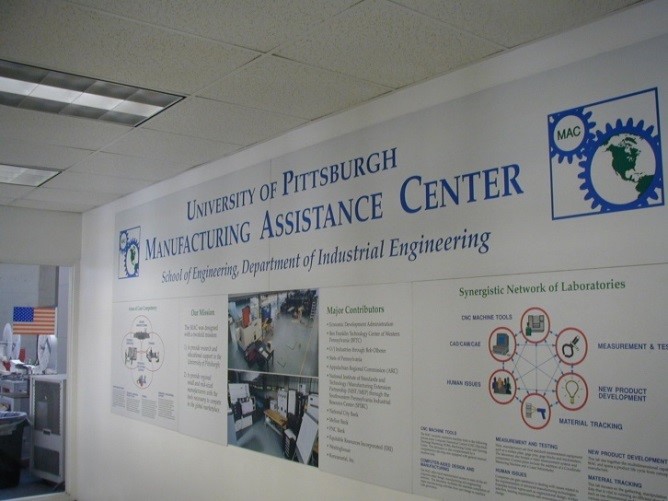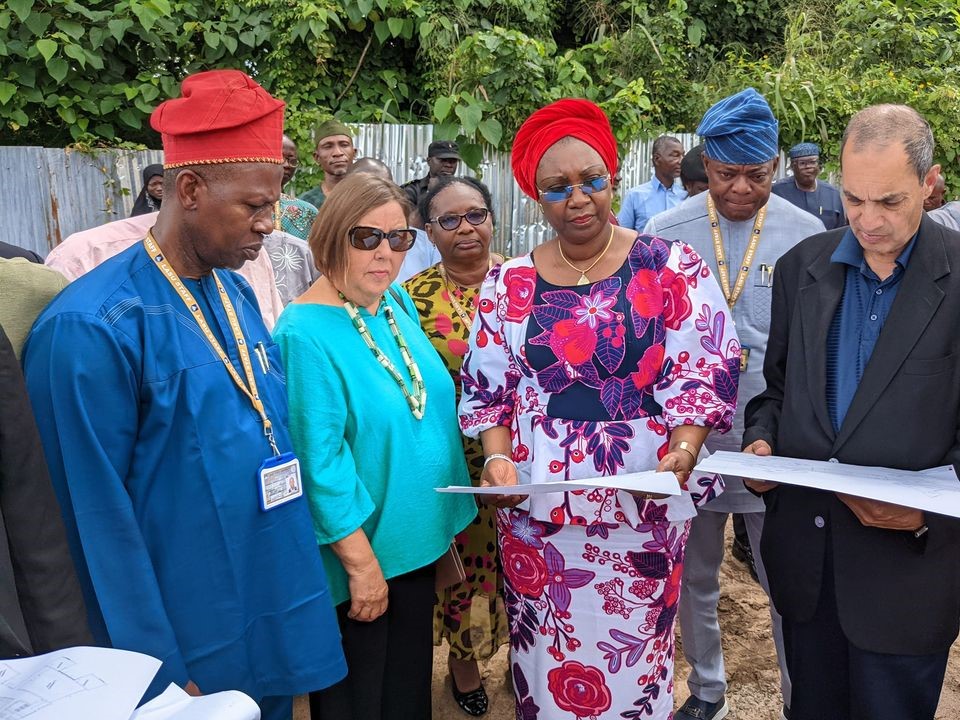The Center for Industry Studies supports multidisciplinary research that helps link scholars to some of the most important and challenging problems faced by modern industry. Our activities and programs are motivated by the firm conviction that bringing engineers and social scientists together for research collaboration can lead to important advances in scholarship and produce research of significant practical value to industry. In building this community of scholars, the Center reaches out to faculty members from all of the social science disciplines and professional schools for research collaboration opportunities with faculty members in the Swanson School of Engineering. The Center also encourages communication between scholars and industry practitioners as a means of building partnerships that can enhance the impact of academic research, yield educational opportunities, and promote economic development.
Background
The MAC was established as a laboratory within the Swanson School of Engineering in 1994 with a grant from the U.S. Department of Commerce. The model utilized here is one of “shared manufacturing”, where machine tools are shared between competing tasks (training, technical projects, small batch production, etc.) and also shared by multiple stakeholders (students, manufacturers, competitors, etc). Most machine tools outside the mass production environment are severely underutilized. For example, machine tools in educational institutions are often utilize for 4-5 each week, if that. In production toolrooms too, machine tools are underutilized because the performance metric in toolrooms is on capability, not utilization. The shared manufacturing model is a commonsense technique to increase this utilization by not incurring any additional capital cost.
Over the past two decades, the MAC has connected thousands of people with meaningful careers in manufacturing and currently offers intensive and experiential training in precision manufacturing, CNC programming and CAD/CAM technologies and helps students master the technical skills that employers in Southwestern Pennsylvania are seeking.
The course curriculum and delivery mode is designed by applying industrial engineering principles as follows:
- Principles of efficient workflow: The courses at the MAC are immersive in nature. Each certificate program is 6 weeks long and students are in laboratory or class for 8 hours each day. The immersive nature of the training allows a lay person to quickly become familiar with a manufacturing environment in a manner similar to immersive language training. These intense experiences utilize the apprenticeship model with small classes (12 student maximum per class) and also efficient workflow principles – the intense nature of the class increases the number of classes each year and also the number of students that can be served.
- Active learning techniques have been proven to be effective and industrial engineering departments around the country are beginning to adopt these principles. Here, students watch online content with taped lectures and machining videos. Mini quizzes are given to students at key milestones in lectures to ensure understanding. Finally, lecture sessions are now transformed into discussions (rather than a traditional classroom lecture), and provided to students after initial learning of technical content is completed. This ensures that students can grasp academic pedagogies at their own pace in the online mode and yet have access to faculty and mentors during lecture sessions.
- Cost effectiveness. The industrial engineering principles of minimizing cost and maximizing productivity are effectively employed. Intense classes increase the utilization of instructor resources and active learning, utilizing the ToolingU immersive learning software, reduces the demand on instructors, who can complete technical projects when students work on their online content.
Then, the MAC’s location in Harmarville became infeasible due to the deteriorating condition of the building. As a result, the RKMellon Foundation has provided funding to move the MAC to an underserved community and neighborhood (Homewood) in the city of Pittsburgh. This neighborhood had seen many challenges in terms of crime, violence, drug trafficking and has a median income level that is significantly lower than nearby neighborhoods. Fortunately, it was located on a major multimodal access point, that will enable the MAC to serve not only the local community but also the entire Allegheny County.
MAC – Homewood
In January 2017, the MAC moved to a newly repurposed building in Homewood, an underserved neighborhood that is home to the most economically disadvantaged population in the city. This location not only provides more transportation options for MAC students but also represents a deep and long-term commitment to all underserved neighborhoods in Pittsburgh.
In Homewood, The Manufacturing Assistance Center (MAC) successfully served employers and individuals in Western Pennsylvania and beyond by imparting manufacturing and machining training and skills to a diverse range of disenfranchised individuals to allow them productive and lifelong careers as CNC machinist and manufacturing specialists.
In order to further strengthen the pipeline with the next generation of manufacturers, a free community makerspace was opened in March of 2018. The MAC Makerspace quickly became a community-based hub of learning that engages members in physical modeling, designing, prototyping, and manufacturing items using tools (i.e., high-quality CNC equipment and related accessories) which would otherwise be inaccessible. Locally-grown enterprises expanded beyond their artisanal and hobbyist roots to create successful businesses[i]. The MAC Makerspace was a collaborative effort within the community and did not replicate but enhanced offerings in the Pittsburgh makerspace ecosystem. It proved to be an especially useful tool to reach out and draw members of the community into the MAC workspace and also to increase the diversity of our participants.
While the Makerspace in the MAC ran workshops, the MAC’s focus was on classes in machining and CNC and 95% of graduates obtained viable and relevant employment in the city of Pittsburgh and also the greater Western Pennsylvania region. The MAC continued to run in Homewood till the pandemic precluded it from implementing its basic premise of the value of experiential, in-person classes. After a year’s pandemic induced, ‘shut down’, the Swanson School of Engineering decided to move it to nearby Titusville.
[i] Muro, Mark and Hirshberg, Peter. Five ways the Maker Movement can help catalyze a manufacturing renaissance. Brookings Institute. 4 January 2017. https://www.brookings.edu/blog/the-avenue/2017/01/04/the-maker-movement-can-catalyze-a-manufacturing-renaissance/

MAC – Titusville
Click here to visit the MAC at Titusville's website.
MAC – Lagos, Nigeria
The Lagos State Government and Lagos State University in Lagos Nigeria have committed to approximately $1 million of funding to construct a building and fund a Nigerian MAC. This MAC is planning to focus its training modules around newer technologies such as 3D printing and train a local workforce to design products and operates these machines. The project is in its early stages with the building construction nearing completion.
The Pitt project team is comprised of the following: Bopaya Bidanda, Ernest E. Roth Professor of Industrial Engineering in the Swanson School of Engineering; John Wallace, Vice Provost for Faculty Diversity and Development and David E. Epperson Chair of the School of Social Work; Ravi Madhavan, Professor of Business Administration; and M. Najeeb Shafiq, Professor of Education (with secondary appointments in GSPIA and Economics in the Kenneth P. Dietrich School of Arts & Sciences). Pitt alum and business executive Adeola Adetunji has been central in making connections on the Nigerian side and serves as the champion of change and de facto Executive Director of the project.

AMAC – Uttarakand, India
The newest MAC project is the creation of an Ayurvedic Manufacturing Assistance Center (AMAC) in the Block Pabaur Village Pauri, HaryaliSain in India. The AMAC collaborates with the Business of Humanity® Project and is being locally sponsored by Ashta Sewa Sansthan.
Ayurvedic medicine is considered an alternative medicine system, but its roots in India have existed for over two millennia. Ayurvedic medicine includes a range of treatments including yoga, massage, acupuncture, herbal medicines and special diets which help encourage a healthy lifestyle. he objective of the project is to reverse urban migration and provide farmers with meaningful and sustainable jobs with potential for micro-entrepreneurship in the Uttarakhand region.
A major problem in this region is that thousands of fields in Uttarakhand are lying fallow because current crops do not provide a sustainable income to farmers. As a result, there are 1,700 abandoned villages in Uttarakhand. This number is expected to rise to 3,000 in the next five years.
Along with our partners, we hope to leverage the rich ecosystem of the lower Himalayas (that abound with wild and cultivated medicinal herbs and berries), to provide a meaningful income to the local population. We propose to establish a traditional Ayurvedic Manufacturing Assistance Center (AMAC) for small batch production.
The project is initially expected to utilize 5 staff members (1 office worker + 4 daily processers), who will work with male and female farmers to cultivate raw materials from farms and local forests. The AMAC will process these raw materials to specifications that can be packaged and marketed.
The AMAC will utilize semi-automatic equipment for small-batch processing. It is important to note that there are no manufacturing operations in the 30+ sq. km catchment area of the project. This condition is echoed in about 90% of 25,000 sq. kilometers of Uttarakhand state where 2000+ villages are in a state of near abandonment due to poverty-driven urban migration. It is our belief that the AMAC will help alleviate this issue by providing employment to villagers, establishing a wraparound workforce development model.
The Pilot Project’s vision is to stem rural to urban migration and transform the community through self-reliance by engaging with 500-1000 watershed farmers. As Ayurvedic food supplements and products also need dairy and organic farm produce, the project will jumpstart the region’s integrated, organic and sustainable development. A series of “ancillary” activities including collecting pine needles (for packaging), wild MFP herbs, traditional coarse grains, commercial rosemary, lemongrass, chamomile, and herbs farming, will also assist in the development of micro-ventures.
Project Director: Devendra Kaintola
Ashta Sewa Sansthan POC: Rakesh Chandra